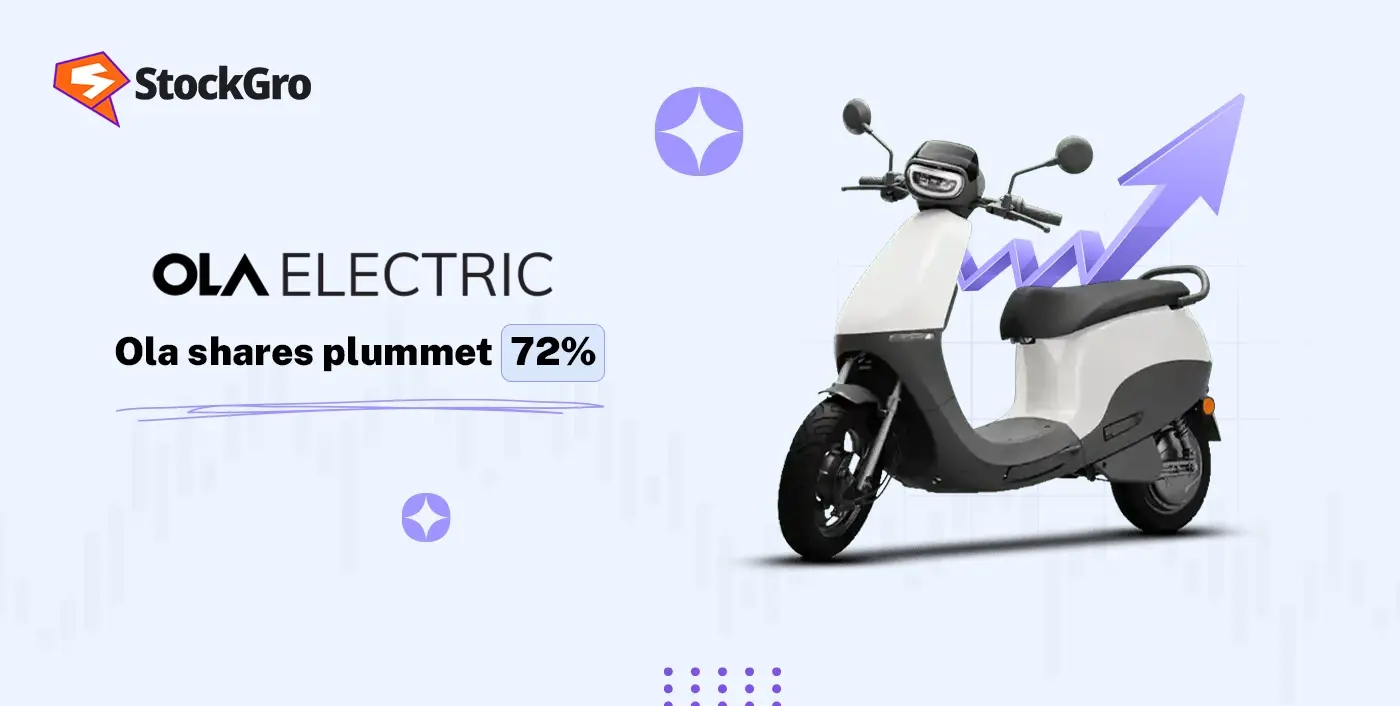
Ola Electric, a name that once echoed in the halls of India’s electric vehicle (EV) revolution, has recently hit a rough patch in the stock market. After reaching a record high of ₹157.40 in August 2024, the company’s stock has plummeted by a whopping 72%. So, what happened, and should investors be panicking or seizing an opportunity? Let’s dive into the details.
Ola Electric’s Rise and Rapid Fall
Ola Electric made headlines when it went public. With the backing of major investors like SoftBank and its ambitious plans for the EV market, the company quickly gained attention. It seemed poised to dominate the electric two-wheeler sector, which was rapidly gaining momentum in India. But, as we know, stock market journeys are rarely linear, and Ola’s path is no exception.
In August 2024, the stock reached its peak at ₹157.40, just six days after listing. Fast forward to today, and the stock has hit an all-time low of ₹43.16, making it clear that things haven’t gone as planned.
Also read: HDB Financial Services IPO Details, Dates, Price Band & Lot Size
Why Is Ola Electric Stock Crashing?
Several factors have contributed to Ola’s stock crash. Let’s break them down:
Weak Financial Performance
The most significant factor in Ola’s stock fall is its poor financial performance. For Q4 FY25, the company reported a net loss of ₹870 crore, which is more than double the ₹416 crore loss from the same quarter the previous year.
Revenue from operations dropped a staggering 62%, down to ₹611 crore. The company’s vehicle deliveries also saw a steep decline, with just 51,375 units delivered in Q4 FY25 compared to 1.15 lakh units in the same quarter last year. The company’s revenue has taken a severe hit, and vehicle deliveries have declined significantly—a dangerous combination for a growth-focused EV company.
Heavy Block Deals Trigger Panic
Alongside the disappointing earnings, Ola’s stock price was also weighed down by large block deals. Earlier this month, a block deal worth ₹731 crore took place, involving the exchange of 14.22 crore shares, equivalent to 3.23% of the company’s total equity. The transaction occurred at an average price of ₹51.40 per share, much lower than the stock’s recent highs, further hurting investor sentiment.
You may also read: Zee Entertainment Stock Surges 12% as Z5 Eyes FY26 Break-Even
EV Market Challenges
It’s also worth mentioning that the overall EV sector is facing challenges. Despite the promising future of electric mobility in India, companies like Ola Electric are struggling with high competition, regulatory pressures, and market saturation. These factors, coupled with weaker-than-expected demand for electric two-wheelers, are contributing to the stock’s sluggish performance.
Ola Electric’s Financial Snapshot (FY25)
Here’s a snapshot of Ola Electric’s key financials for FY25:
| Metric | Value |
| Q4 FY25 Net Loss | ₹870 crore |
| Q4 FY25 Revenue | ₹611 crore |
| YoY Revenue Decline | 62% |
| Vehicle Deliveries (Q4 FY25) | 51,375 units |
| Total Vehicles Delivered (FY25) | 3.59 lakh |
| Adjusted FY25 Revenue | ₹4,665 crore |
| Consolidated EBITDA Margin | -34.6% |
While Ola Electric did manage to deliver 3.59 lakh units during the year, the deepening losses and declining profit margins remain major concerns. The adjusted revenue and negative EBITDA margin are clear indicators of the ongoing struggles.
Ola Electric Stock Technical Performance
From a technical standpoint, Ola Electric’s stock is not looking strong either. The stock is trading well below all its key exponential moving averages (EMAs), and its relative strength index (RSI) is nearing 30. An RSI below 30 typically signals that the stock is oversold.
You may also read: AU Small Finance stock analysis & expert insights in detail
What Should Investors Do?
If you’re holding Ola Electric shares, here are a few things to consider:
- Be cautious: The stock is deeply oversold, but recovery is not guaranteed unless the company significantly improves its financials.
- Look for long-term growth: If you believe in the long-term growth of the EV sector, you might see this as an opportunity to buy at a discounted price. However, it’s important to monitor the company’s future earnings and delivery numbers closely.
- Follow the sector trends: Keep an eye on the overall EV market. If the sector picks up momentum and Ola can overcome its current struggles, the stock could see significant growth in the future.
Key Takeaways for Ola Electric Investors
- Weak financial performance: Ola Electric’s Q4 FY25 results showed a significant increase in losses and a steep decline in deliveries.
- Stock trading near oversold levels: The stock’s RSI is nearing 30, suggesting it may be oversold, but that doesn’t mean the stock is a buy just yet.
- Watch for upcoming reports: Investors should pay attention to the next set of earnings and delivery data to assess whether Ola Electric can recover.
Ola Electric’s steep fall in stock price is a clear reflection of its current struggles. For now, the stock remains a high-risk, high-reward bet. Investors must closely track the company’s next financial performance and its efforts to stabilise operations.
If Ola Electric can overcome these hurdles, the current low share price might eventually look like a bargain. But for now, caution is key.

